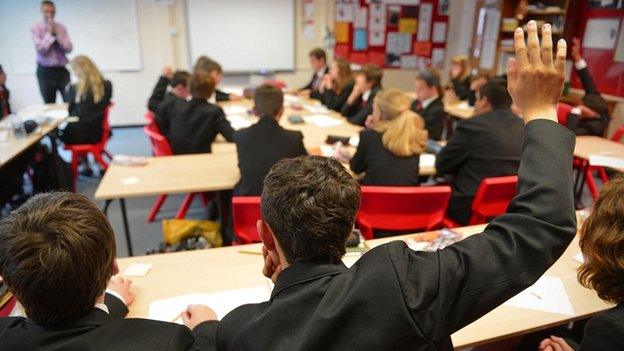Funding shake-up risks cuts in most schools, say unions
- Published
- comments

Funding shake-up risks cuts in most schools, say unions
Government plans designed to address "unfair" and "inconsistent" funding in England's education system risk cuts in most schools, say teachers' unions.
Even schools in some of the worst funded areas, which the new National Funding Formula aims to help, will lose out, according to one union's analysis.
A separate set of calculations suggest 98% of schools face "a real terms funding cut for every pupil".
The government said it wanted to end a "postcode lottery" in school funding.
The Association of School and College Leaders, which represents secondary heads, examined official figures on the national funding formula proposals, external.
These reveal that Cheshire East and Trafford, both among the lowest 10 funded areas, are projected to lose under the new formula, due to be implemented next year.
Cheshire East will be down 2.1% and Trafford will be down 0.4%, says ASCL.
The union says it is concerned that the proposed formula sets the basic level of funding too low.
'Political priority'
Interim General Secretary Malcolm Trobe called for an immediate increase in school funding to address problems caused by rising costs and frozen budgets.
"The government is trying to slice up a cake which is too small," he said.
"It needs to put more money into the system and make education a political priority."
Separately, an alliance of six unions representing school staff have published a "league table", external of England's 533 Parliamentary constituencies, showing that schools in each one stand to lose out under the plan.
The six unions - the National Union of Teachers, Association of Teachers and Lecturers, National Association of Head Teachers, Unison, Unite and GMB, say this amounts to an average loss of £339 for every primary pupil and £477 for every secondary pupil.
They highlight losses of:
£655 per pupil in Education Secretary Justine Greening's Putney constituency, with the worst-hit school losing £834 per pupil
and £377 per pupil in Prime Minister Theresa May's Maidenhead constituency, with the worst hit school losing £872 per pupil.
Last week, head teachers from West Sussex wrote to MPs warning that the funding shake-up had failed to tackle "extremely bleak budget shortfalls".
They asked their local MPs how they should cut spending, whether they should lay off teaching staff, reduce school hours or close counselling services.
And in December, the National Audit Office warned state schools in England would have to find £3bn in savings by 2019-20.
The six unions say, that unless this shortfall is addressed successful implementation of the new funding scheme will be threatened.
"Every single MP in England has reason to be worried about our latest analysis," said NUT General Secretary Kevin Courtney.
He warned of overcrowded classrooms and staff cuts, with schools "on their knees trying to make ends meet".
'Wake-up call'
NAHT General Secretary Russell Hobby said that while a new funding formula was "the right thing to do... it cannot be truly fair unless there is enough money to go round in the first place."
GMB General Secretary Tim Roache called the figures "a wake-up call", while ATL General Secretary Mary Bousted said: "Instead of wasting money on expanding grammar schools, the government needs to put the money where it will make the most difference, funding existing schools adequately."
The government accused the unions of "blurring two separate debates - the total level of funding for schools and the distribution of that funding".
A Department for Education spokesman said the current system for distributing school funding was "unfair, opaque and outdated and the proposals we are currently consulting on will mean an end to this postcode lottery".
The spokesman said the plan would mean a cash boost for more than half of England's school's by 2018-19.
"We recognise that schools are facing pressures, which is why we will continue to provide advice and support to help them use their funding in cost effective ways, including improving the way they buy goods and services, so they get the best possible value for their pupils," he added.
- Published10 January 2017

- Published14 December 2016

- Published14 December 2016

- Published21 July 2016

- Published7 March 2016
